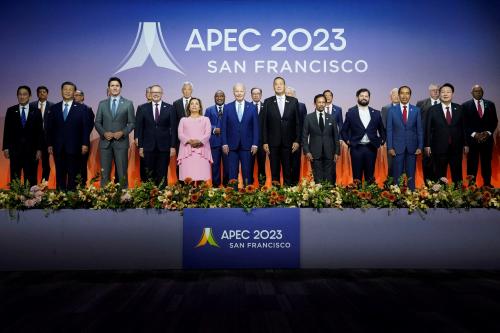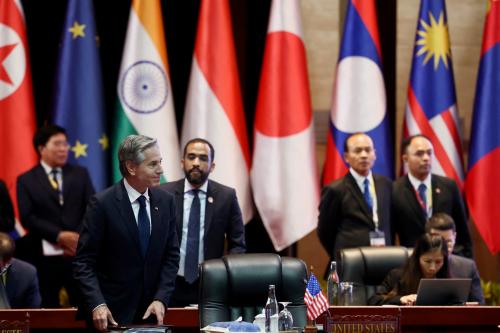The best that can be said about US-European Union discussions last week on global warming is that both sides had a chance to air their views. President George W. Bush insisted that the Kyoto Protocol was fatally flawed and that more studies were needed before deciding what to do. European leaders countered that it was time to act and that Kyoto was crucial to avoiding a global catastrophe.
Diplomatic niceties, however, cannot paper over the chasm that separates these two views. Indeed, the intensity of the split could well match that of the dispute over the Iran-Libya Sanctions Act, a quarrel that, during the late 1990s, infected virtually every aspect of transatlantic relations.
Disagreements over global warming can be prevented from following a similar path, but only if both US and European leaders start putting long-term environmental concerns above domestic politics. Last week’s talks were not promising in that respect.
Europeans, hoping that the US public will solve the problem by forcing Mr Bush to embrace Kyoto, are likely to be disappointed. Few Americans list global warming as a top concern or worry that it will threaten them in their lifetime. And while two out of three Americans say the US should act to avert climate change, less than half say they would pay 25 cents more for a gallon of gasoline to help it do so.
Democrats, newly in control of the Senate, no doubt hope to change those assessments. But Mr Bush has two strong talking points, especially now that he grants#mdash;however grudgingly#mdash;that global warming is occurring.
One is that the four-year-old Kyoto accord it has yet to be ratified by a single European country, most of which have made little progress in curbing their own emissions. In fact, only Britain and Germany have succeeded in curbing emissions, and the latter has done so only because Kyoto’s counting rules allow it to take credit for shutting down East Germany’s highly inefficient industries.
Bush can also credibly assert that Kyoto is unfair because it exempts big emitters such as China and India. Americans will recoil from any treaty that does not ask all countries to play a role in preventing climate change
Europeans, therefore, are likely to face a US administration unwilling to budge from its view that the Kyoto agreement is a non-starter
Europe can thus proceed in one of two ways. The first is to continue on its present course of criticising Mr Bush for failing to see Kyoto’s merits and calling for him to change course.
That strategy is politically convenient and emotionally satisfying, given widespread European irritation at the US president’s high-handed dismissal of Kyoto. Yet it will do nothing to curb the growing emission of greenhouse gases. It may even be counterproductive, fuelling suspicions#mdash;found not just in the US#mdash;that Europe prefers posturing to the pursuit of actual emission cuts
The other choice would be to pursue a policy commensurate with Europe’s claim that it is ready to play a leadership role in world affairs. Such a strategy would consist of three elements. First, Europe should admit that Kyoto is dead. The cause of preventing climate change is not served by pretending that the treaty provides a workable framework for reducing carbon emissions. The targets are too ambitious to be realistic and the demands unfairly distributed among countries.
Second, Europe should take the initiative in proposing an alternative treaty framework that still calls on the US to make deep cuts in emissions but that addresses Mr Bush’s legitimate complaints about Kyoto. That means offering a sensible emissions trading programme, a market-based approach that can substantially decrease the cost of reducing emissions.
It also means creating a mechanism for bringing developing countries into the process. Proposing an alternative treaty that acknowledges US concerns would put pressure on Mr Bush to put up or shut up on his pledge to work within the 1992 United Nations Framework Convention on Climate Change.
Third, Europe should honour its own pledges to cut its greenhouse gas emissions unilaterally and challenge Mr Bush to live up to his own repeated promises to take the issue seriously. Tangible European progress on reducing emissions would rebut his accusation that Europe is all talk and no action and expose his unwillingness to support anything but further study of the issue as the cop-out that it is. It would also give political ammunition to those in the US who support more aggressive policies to combat global warming.
No doubt such a strategy would be difficult for many Europeans to swallow. It requires putting aside their indignation over the Bush administration’s unwillingness to endorse Kyoto. But the real issue is not how to score political points but to make progress on preventing climate change. Both European and US leaderships need to show they know the difference.



Commentary
Op-edBeyond Kyoto
June 18, 2001